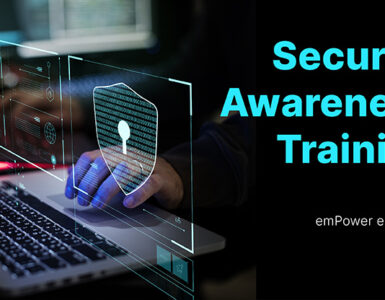 If you’re encouraging best practices, don’t weaken your message by breaking the law.
If you’re encouraging best practices, don’t weaken your message by breaking the law.
Every now and then, I see a security awareness training presentation that makes extensive use of material from other sources – usually images and/or text copied from sources on the Internet. When queried, the author of the security awareness training presentation says something like this:
I’ve looked through the [insert website name here] website and see no copyright info of any kind on it. So it must be OK to use it.
In 99% of instances, this is NOT the case.
The absence of a copyright notice has no impact on the copyright status of materials. Under the Berne Convention for the Protection of Literary and Artistic Works , copyrights for creative works are automatically in force at creation: the author doesn’t need to “register” or “apply for” a copyright. The USA has been a signatory to the Convention since 1989, so it’s reasonable to assume that anything from a US source published on the Internet (which became available in the 1990s) falls under this provision. [One exception to this is works produced by the US Federal Government … but let’s not get too concerned with that right now]. Most other countries were signatories before this time.
In other words, material published on the Internet should be assumed to be covered by copyright unless:
- explicitly placed in the public domain (which does not mean the same as published on the Internet); or
- released under a license such as a Creative Commons license; or
- you know for a fact that it’s out of copyright e.g. the text of a very old book.
The US Copyright Act does allow for the use of copyright content without permission in some instances (although a friend who’s a copyright lawyer pointed out that this use still “infringes on the copyright” even though it’s allowed under the law). This is called “Fair Use” and is defined like this:
Notwithstanding the provisions of sections 106 and 106A, the fair use of a copyrighted work, including such use by reproduction in copies or phonorecords or by any other means specified by that section, for purposes such as criticism, comment, news reporting, teaching (including multiple copies for classroom use), scholarship, or research, is not an infringement of copyright. In determining whether the use made of a work in any particular case is a fair use the factors to be considered shall include-
- the purpose and character of the use, including whether such use is of a commercial nature or is for nonprofit educational purposes;
- the nature of the copyrighted work;
- the amount and substantiality of the portion used in relation to the copyrighted work as a whole; and
- the effect of the use upon the potential market for or value of the copyrighted work.
The fact that a work is unpublished shall not itself bar a finding of fair use if such finding is made upon consideration of all the above factors.
Ref: http://en.wikipedia.org/wiki/Fair_use#Fair_use_under_United_States_law
Let’s look at a simple example – you’re creating a presentation and want to use a cartoon from a website without permission of the owner. Would this be OK?
Although I’m not a lawyer (the standard disclaimer!), it seems to be fairly clear that this wouldn’t be OK. It would appear that this would fail under factor 3 (the whole cartoon would be used – not just a portion of it) and possibly factor 1 (depending on whether the presentation was going to be given away or not). The owners would probably also argue (if they wanted to sue) that the use impacted the future potential value of the work – factor 4.
This is a VERY complicated area of copyright law, and you’d be well advised to consult a lawyer with expertise in this particular area of intellectual property law if you have any questions. But, as a general rule, it would be wise to assume that you can’t reuse materials published on the Internet unless specifically allowed to do so by a license published on that website.





